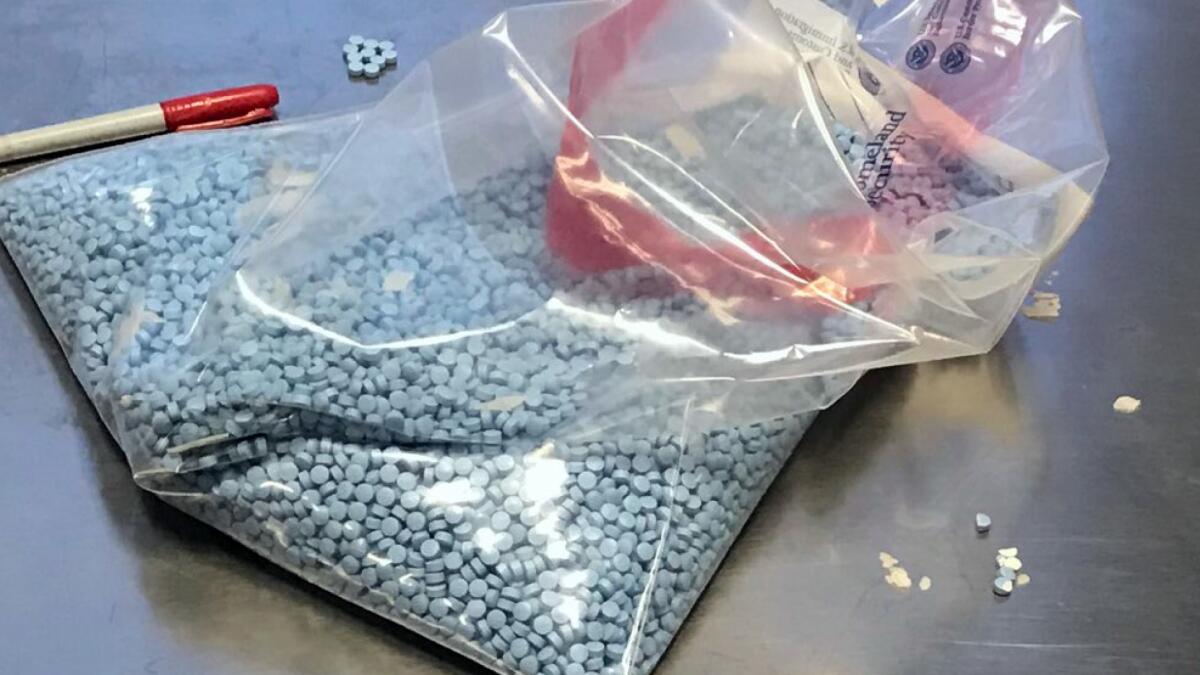Spike in accidental fentanyl deaths in San Diego County prompts outreach to parents

- Share via
SAN DIEGO — A 17-year-old high school student bought a pill from a friend that looked like a prescription painkiller, a pill he took before school. But the blue tablet was counterfeit — and contained a lethal dose of fentanyl.
When Connor White didn’t show up for his first two classes at Cathedral Catholic High, his worried father — a Cathedral teacher — headed home. He found his son, a straight-A student and member of the school’s football team, dead from an overdose.
Connor died May 5, 2021, one of a dozen San Diego County youths who accidentally overdosed on fentanyl last year. Deaths involving the synthetic drug have shot up 2,300% in the region since 2016.
The spread of fentanyl-laced pills is so insidious, and the number of deaths so alarming, San Diego County officials are working to warn people in the region about the dangers. On Wednesday, several took part in a virtual town hall.
“This is an emergency and I’m going to be putting something forward declaring an emergency,” county Supervisor Jim Desmond said near the end of the event. “This is poison, it’s murder and it needs to be dealt with.”
Panelists for the Zoom meeting included state and federal prosecutors, medical experts, the chief medical examiner and others. About 350 people registered to watch, and a recording was posted on YouTube.
For 90 minutes, panelists talked about the dangers of fentanyl — a powerful synthetic opioid that is similar to morphine but is 50 to 100 times more potent.
Viewers were told how to spot an overdose by listening for a loud “death rattle” snore as the person struggles to breathe and looking for pupils that constrict to pinpoints. They were told to have the nasal spray naloxone on hand to administer to try to reverse the effects of opioids.
And they learned how teens and others use their cellphones and social media apps like Snapchat, Facebook and Instagram to easily buy drugs.
Opioid overdoses are a national crisis, an escalating problem that last year claimed more than 107,000 lives. Fentanyl is the No. 1 killer among people ages 18 to 45 years old, nationally and locally.
In San Diego County, at least 817 deaths have been classified as unintentional fentanyl overdoses in 2021 by the county Medical Examiner’s Office, with more possible as the county catches up on a backlog of toxicology testing.
The region has seen a “shocking” 2,300% increase in fentanyl deaths since 2016, Chief Medical Examiner Steven Campman told the group.
As the numbers have soared, county officials have stepped up efforts to educate residents about fentanyl. In March, local officials hosted a fentanyl policy roundtable that included county, state and federal law enforcement officials and others. Last week, officials declared “Talk to your kids about fentanyl” week.
Users are warned that “one pill can kill.”
Connor’s mother, Laura Brinker White, said she and Connor’s father were “very engaged” parents and had extensive conversations with their son about drugs.
“Like any adolescent, he liked to push the boundaries. Unlike when we were growing up, pushing the boundaries has become much more dangerous,” Matt White said during the Zoom meeting. “Somewhere in his developing teenage brain, he thought it wouldn’t happen to him.”
Brinker White said labeling her son’s death an overdose made it extremely hard for her to discuss it with others. She sees it as poisoning.
“What I came to realize is Connor was not a druggie [who] got negligent and overdosed. He was a normal teen [who] was poisoned,” she said. “These dealers deceive naive young adults into buying what seems to be a relatively safe prescription drug but they are not.”
Officials said the region’s proximity to the border means there are millions of counterfeit pills flowing through San Diego County. While fentanyl comes in powder and pill form, pills seem to be the drug of choice for teens, said Deputy Dist. Atty. James Fontaine, chief of the office’s major narcotics division.
He said drug suppliers often are friends or classmates of overdose victims. “In many cases, the dealer has no idea the substance they are providing actually contain fentanyl,” he said.
Those who supply fentanyl that results in death or serious injury can face federal prosecution where a conviction can result in a 20-year mandatory minimum sentence.
Talking about drugs with children can be difficult. Dist. Atty. Summer Stephan suggested parents frame their discussions by advising their children to see themselves as protectors or helpers. That may keep them from feeling accused or becoming defensive, she said.
“You want them to know this information so they can intervene and be a helper to save their friend from a dangerous situation,” she said.
More to Read
Sign up for Essential California
The most important California stories and recommendations in your inbox every morning.
You may occasionally receive promotional content from the Los Angeles Times.














